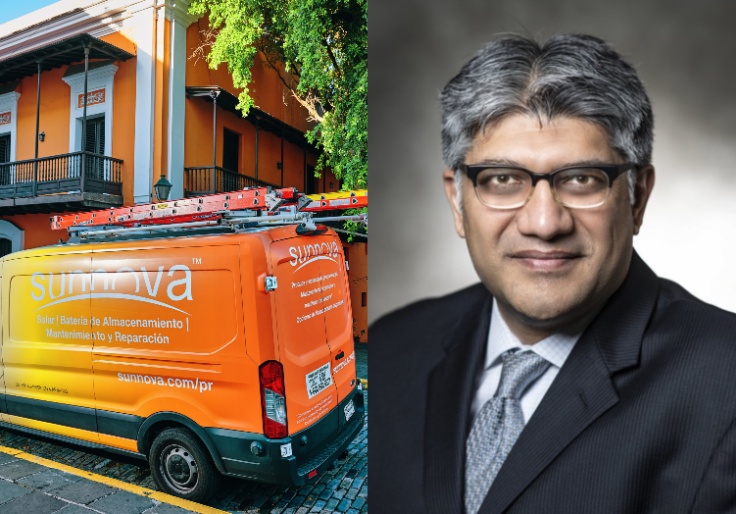Biden Admin Gave $3 Billion Loan to Solar Company Accused of Scamming Elderly
‘Ripping off old people’: Over 50 consumer complaints filed against Sunnova in Texas since last year

A solar company that was awarded a $3 billion Department of Energy loan has been accused of scamming dementia patients on their deathbeds into signing five-figure, multi-decade solar panel leases, according to interviews and state consumer complaint records obtained by the Washington Free Beacon.
Terry Blythe, a Texas resident, told the Washington Free Beacon that her father was 86 years old and had been diagnosed with dementia when a door-to-door Sunnova salesman persuaded him to sign a 25-year solar panel lease in 2020. When her father passed away earlier this year, Blythe said she was left to grapple with the $34,000 contract.
How not a SINGLE electric vehicle charging station has been constructed in the two years since Biden demanded $7.5 BILLION be spent on nationwide network
 Not a single electric vehicle charging station has been completed in the two years since the bipartisan infrastructure bill passed, after President Joe Biden urged Congress to spend $7.5 billion on it.
Not a single electric vehicle charging station has been completed in the two years since the bipartisan infrastructure bill passed, after President Joe Biden urged Congress to spend $7.5 billion on it.
“It was truly ripping off old people,” she said. “It was the biggest ripoff I’ve ever seen.”
Blythe said she sold her parents’ home, which was in disrepair and in a low-income neighborhood, to pay for her mother’s assisted living care. But she said she was forced to take a significant price cut because buyers weren’t willing to pay for the entire solar panel contract.
“If I can’t recoup the money my mom needs, at least maybe I can help others that they might scam,” she said. “The fact that they were just awarded that much money from the government is sickening.”
Blythe’s is one of over 50 consumer complaints that have been filed against Sunnova with the Texas attorney general’s office since last year, for issues ranging from maintenance delays to allegedly predatory sales tactics.
The news comes as the DOE’s Loan Programs Office is facing scrutiny from Congress over potential conflicts of interest involving the $3 billion federal loan to Sunnova Energy. The funding, which is the largest-ever DOE commitment to a solar company, will help finance Sunnova’s solar panel loans to “disadvantaged homeowners and communities,” according to the company.
Mary Loller told the Free Beacon that her elderly father was senile and had been given months to live when a door-to-door Sunnova salesman sold him a $60,000 solar system for his mobile home last year.
“My dad told [the salesman] at that time he was on hospice and dying. And basically, he wasn’t in his right mind,” said Loller.
Her father passed away soon after. Loller said Sunnova placed a lien on the mobile home, which prevented the family from selling the property.
Blythe and Loller shared correspondence with the Free Beacon showing that they contacted Sunnova about the troubling sales practices. They said the company has not resolved the issues.
A spokesperson for Sunnova told the Free Beacon that the company “cannot and [does] not decline to enter into an agreement based on a customer’s age.”
“All customers, regardless of age, are required to complete a thorough validation process where we confirm their identity and ensure that they have read and comprehended the terms of their agreements,” the spokesperson said, adding that the company is “fully dedicated to assisting all our customers in resolving any issues that may arise during the life of their agreement or due to external factors.”
The DOE did not respond to a request for comment.
Other consumer complaint records tell similar stories. One Harris County, Texas, woman said her 80-year-old mother was “blind, bed bound, partially deaf, on dialysis, with congestive heart failure” when Sunnova sold the elderly woman a 25-year, $86,000 contract. The mother died three months later.
“Sunnova used predatory lending tactics and fraud to execute a 25 year contract on an elderly woman that was dying, and would never live 25 years to pay off a contract of this magnitude,” the complaint read.
Another woman said she was trying to sell the home of a deceased man when she discovered that he had been sold a 25-year solar contract by Sunnova at age 78. She said prospective home buyers didn’t want the solar panels, and she was stuck paying off the $40,000 lease.
“I believe that should be a criminal offense right there,” she wrote in the complaint.
The Texas attorney general’s office did not respond to a request for comment.
Energy experts say the consumer records should have raised alarms when the DOE was vetting the company.
“This is reminiscent of the mortgages of the 2000s, just getting people to sign, with no care at all as to the consequences,” one former DOE official told the Free Beacon. “Why not just call it subprime solar?”
Sen. John Barrasso (R., Wyo.), the top Republican on the Senate Energy and Natural Resources Committee, and other lawmakers have been investigating potential conflicts of interest at the DOE’s Loan Programs Office (LPO), including its funding to Sunnova.
Before LPO director Jigar Shah joined the Biden administration, he founded and led a trade association called Cleantech Leaders Roundtable, which shares a board member with Sunnova. Cleantech Leaders Roundtable has become a gatekeeper for companies seeking loans from Shah’s office, cohosting paid events for its members with the LPO director, the Free Beacon reported in October.
“The potential for conflicts of interest, especially in light of a $3 billion loan approval for Sunnova, a company who shares a board member with Cleantech Leaders Roundtable, cannot be overlooked,” said Barrasso in a letter to DOE’s ethics counsel Susan Beard this month.
Shah, who was dubbed “Joe Biden’s $400 billion man” by the Wall Street Journal due to his control over the staggering loan program budget, downplayed his role in testimony to Congress last month.
“I’m not that important,” he said, adding that his job is to “promote the loan programs office,” not to approve the loans.












